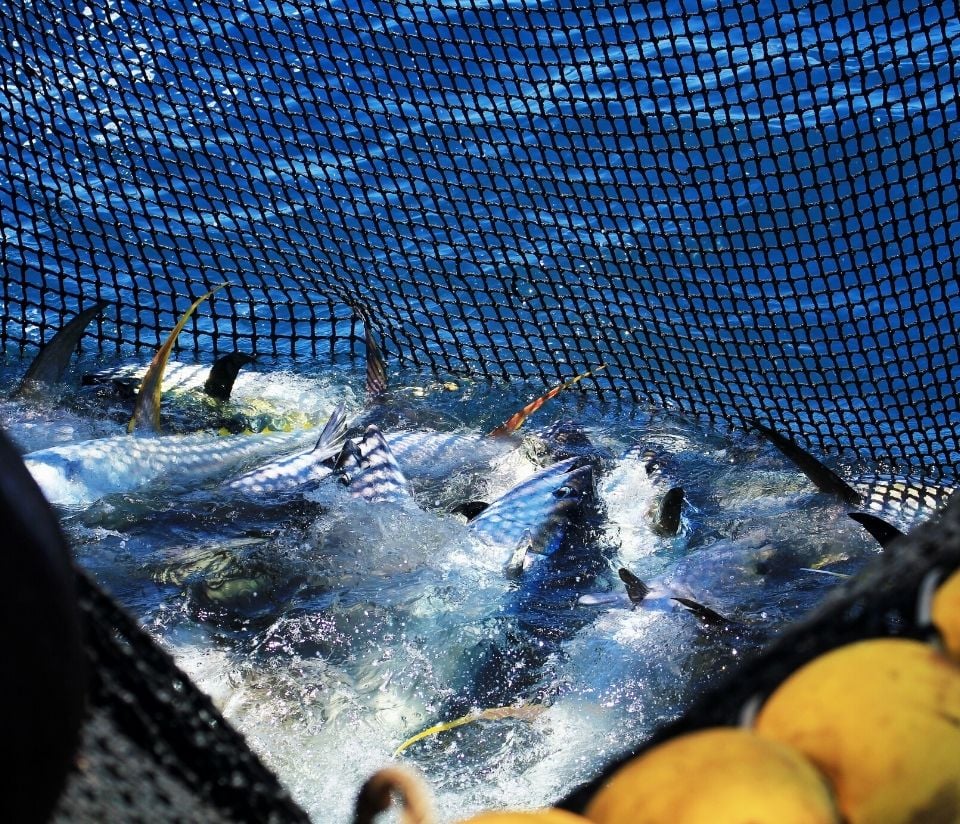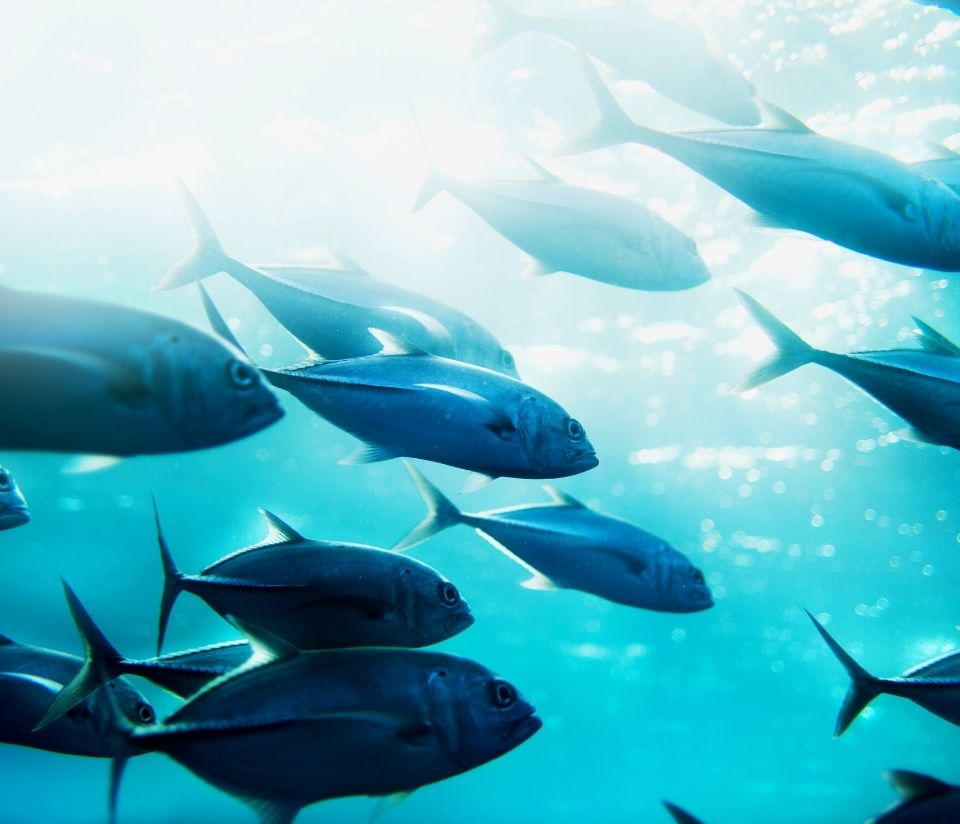Ethical Tinned Tuna
Which Tuna brands are the most ethical and sustainable? For the answer, see our Ethical Tinned Tuna Ratings Table to compare brands’ ethical scores.
Tinned tuna? A sustainable tuna alternative? Or a marine catastrophe?
Tinned tuna has become synonymous with the issue of sustainable fishing. This species of powerful marine predator has helped to raise awareness of overfishing and unethical fishing practices. Many of us are familiar with images of dolphins, turtles, seabirds and sharks caught up in tuna nets. Additional problems with tinned tuna include: FADs, “neocolonial plundering”, and the endangering of certain tuna species, such as the bluefin.
But with the increase of fish waste, buying line caught tinned tuna could be a more sustainable tuna option for ethical shoppers.
For comprehensive and easy-to-understand comparisons of sustainable tuna brands, check out our Ethical Tinned Tuna Ratings Table. See how these brands score for issues relating to the Environment, Animals and People.
‘Dolphin friendly’ tinned tuna: What are the consequences for marine ecosystems?
Schools of tuna often swim alongside dolphin pods. Dolphins offer some protection for tuna from sharks. (This also means that sharks often trail tuna schools, and swim close by.) Because of this symbiosis, some commercial fishing boats follow and herd dolphin pods, in order to catch the tuna schools that swim underneath. As the fishing boats put down their nets, dolphins can be caught, tangled, injured, drowned or distressed in the process. Public outcry about this has meant that some tinned tuna is branded with a ‘dolphin safe’ label or logo.
However, some international ‘dolphin friendly’ certifiers are not without their own controversies. In 2013, a village in the Solomon Islands claimed that The Earth Island Institute did not pay the full amount that had been promised to them to stop dolphin hunting. The Earth Island Institute is a ‘dolphin safe’ certification which appears on John West tinned tuna products, as well as other tinned tuna brands.) In retaliation against the Earth Island Institute, the villagers began traditional dolphin hunting practices again, as they said they could not survive without the money promised to them.
Similarly, there is some doubt from Greenpeace about the validity of the MSC certification (Marine Stewardship Council), as some verified fisheries still use unsustainable fishing methods.
Brands such as Fish4ever, John West, King Oscar and Kingfisher score well on our Ethical Tinned Tuna Ratings Table across criteria for Environment, Animals and People and so those looking to buy sustainable tuna can look out for these popular brands!
By contrast, supermarket-owned brands and Princes rate very poorly on our ethical comparison tables, so ethical consumers might want to avoid these brands.
UK ethical consumers can also be reassured that almost all UK tinned tuna is skipjack tuna. Skipjack does not swim close to dolphin pods, and so it is unlikely that dolphins will have been harmed in the fishing process. But being ‘safe for dolphins’ does not necessarily mean that you are buying sustainable tuna. Just because dolphins have not been caught in tuna nets, it doesn’t mean that sharks, turtles, seabirds and other fish species aren’t part of the bycatch.
That’s why we recommend checking our ethical comparison tables, so you don’t have to ‘trawl’ the internet for articles and research; it’s all here on our tables for you!
What is a fish aggregating device (FAD)?
An FAD is a floating, man-made device that attracts fish, often ensnaring them in purse seine nets, gillnets or drift nets. However, both FADs and purse seine nets are indiscriminate in what they trap, and all kinds of marine life ends up as bycatch. Therefore, tinned tuna that has been caught by FAD or seine nets are often not a sustainable tuna option. Purse seine nets can also catch whole schools at once, and so have been linked to overfishing and endangering some species of tuna. Overfishing of the yellowfin tuna in developing and poor coastal communities causes and perpetuates poverty.
Line caught tuna, pole caught tuna or troll caught tuna are good alternatives to tuna caught in purse seine nets. Line caught tuna has a relatively low bycatch rate, as long as the line is short. Short lines can be put into the sea with more accuracy than long lines can, and they stay in the water for a shorter amount of time, meaning that marine wildlife is less disturbed.

Fish waste: How tinned tuna could be the answer to the environmental problems with fresh fish
An extensive report from the FAO recently stated that,
“[a] large proportion of …aquaculture production is lost or wasted…”
35% of the global harvest of fish is thrown away before it even reaches our plates.
Fish spoils very quickly, and global consumer and retailer demand for fresh fish is high. Journalist Holden Frith suggested on The Week Unwrapped that buying tinned tuna could be a more sustainable way of buying fish, as canning or freezing food reduces waste. However, Frith also recognises that buying canned fish often means buying from large commercial fishing brands, rather than from small independent fishermen and women.
Finding sustainable tuna can be a tricky and complex process, but buying line caught tuna, skipjack tuna and avoiding controversial brands is a good place to start.
If you want to eat tinned tuna as part of a balanced diet, why not read our article on Ethical Vitamins and Supplements to find out how you can buy vegan Omega-3 supplements. Or why not try buying locally-sourced line caught mackerel. Mackerel has similar nutritional values to tuna, and supports UK fishing communities. If you live near the sea, you could even give mackerel fishing a go yourself from a beach, pier, jetty or boat in the spring and summer. Fishing for your own mackerel and taking home only what you will eat has very little environmental and humanitarian impact, and could be a good alternative to tinned tuna.
For more information on sustainable fishing practices, visit the Greenpeace website.
See our Ethical Tinned Tuna Ratings Table to compare brands
The Good Shopping Guide has researched the most popular and accessible brands of tinned tuna; click on any brand name to find out more about its ethics and sustainability efforts and policies.
Fish4ever, John West, King Oscar, Kingfisher, Parmentier, Rio Mare, Graal, The Nice Fisherman and Princes.
